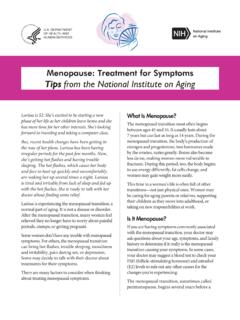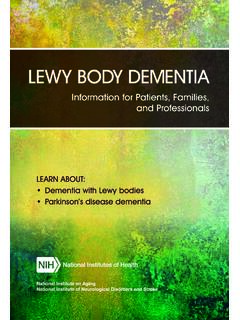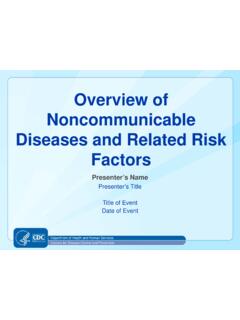Transcription of Understanding Alzheimer’s Disease
1 Understanding alzheimer s Disease What you need to know From the National Institute on Aging For copies of this booklet, contact: alzheimer s and related Dementias Education and Referral Center Table of Contents Introduction 1 What is alzheimer s Disease ? 3 What are the signs of alzheimer s Disease ? 4 When should you see your doctor? 7 What are other causes of memory problems? 9 Are there treatments for alzheimer s Disease ? 11 What about research on alzheimer s Disease ? 13 Is there help for caregivers? 15 Summary What you need to know 16 Where can you get more information? 17 Words to know 19 Many older adults and their families are faced with alzheimer s Disease . It s important to know the signs of the Disease and where to get help.
2 Introduction Many older people forget someone s name or misplace things from time to time. This kind of forgetfulness is normal. But, forgetting how to get home, getting confused in places a person knows well, or asking questions over and over can be signs of a more serious problem. The person may have alzheimer s Disease (pronounced Allz-high-merz duh-zeez). It is a Disease of the brain that begins slowly and gets worse over time. This booklet will help you learn about alzheimer s Disease : what it is signs of the Disease when it is important to see your doctor treatment research studies how to get help caring for a person with alzheimer s Tips about using this booklet Use the Table of Contents to help you find things quickly.
3 Also, we put some medical terms in bold, such as alzheimer s can find how to say these words and what they mean in the Words to know section on page 19. 1 Helen s story I have alzheimer s Disease . It took me a long time before I could even say the words. When the doctor first told me, I felt like my life was over. For a while, I was depressed. My doctor told me about medicine I could take. She said it would slow down my memory loss for a while. I know it s not a cure. Still, it feels good to do something. My family has been wonderful. They re helping me plan for the care I ll need. I have decided to take each day as it comes. I want to live my life as fully as I can. 2 What is alzheimer s Disease ? alzheimer s Disease is an illness of the brain.
4 It causes large numbers of nerve cells in the brain to die. This affects a person s ability to remember things, think clearly, and use good judgment. Doctors don t know what causes the Disease . They do know that most of the time it begins after age 60. What happens when a person has alzheimer s Disease ? alzheimer s Disease often starts slowly. In fact, some people don t know they have it. They blame their forgetfulness on old age. However, over time, their memory problems get more serious. People with alzheimer s Disease have trouble doing everyday things like driving a car, cooking a meal, or paying bills. They may get lost easily and find even simple things confusing. Some people become worried, angry, or violent. As the illness gets worse, most people with alzheimer s Disease need someone to take care of all their needs, including feeding and bathing.
5 Some people with alzheimer s live at home with a caregiver. Other people with the Disease live in assisted living or a nursing home. 3 What are the signs of alzheimer s Disease ? It s important to know the signs of alzheimer s Disease . If you know the signs, you can get help right away. Some signs of the Disease are listed here: Early signs finding it hard to remember things asking the same questions over and over having trouble paying bills or solving simple math problems getting lost losing things or putting them in odd places Later signs forgetting how to brush your teeth or comb your hair being confused about time, people, and places forgetting the names of common things such as a desk, house, or apple wandering away from home 4 Mild cognitive impairment Some older people have a condition called mild cognitive impairment, or MCI.
6 It can be an early sign of alzheimer s. But, not everyone with MCI will develop alzheimer s Disease . People with MCI can still take care of themselves and do their normal activities. MCI memory problems may include: losing things often forgetting to go to events or appointments having more trouble coming up with words than other people of the same age If you have MCI, it s important to see your doctor or specialist every 6 to 12 months. Ask him or her to check for changes in your memory and thinking. Differences between alzheimer s Disease and normal aging Use the chart below to help you understand the differences between alzheimer s Disease and the normal signs of aging. alzheimer s Disease Normal aging Making poor judgments and decisions a lot of the time Making a bad decision once in a while Problems taking care of monthly bills Missing a monthly payment Losing track of the date or time of year Forgetting which day it is and remembering it later Trouble having a conversation Sometimes forgetting which word to use Misplacing things often and being unable to find them Losing things from time to time 5 Rita s story A few months ago, my mother started having trouble remembering things.
7 Sometimes, she couldn t find the right words. Then, she got lost on her way home from the store. I knew something was wrong. I talked with my mom, and we decided to see her doctor. The doctor asked about the changes we had seen and did a medical exam. He also changed one of Mom s medicines to see if that would make a difference. And, he suggested that she see a specialist who could test her memory and thinking skills. He said it was good that she came in now instead of waiting so we could start figuring out what the problem might be. 6 When should you see your doctor? If you or someone in your family thinks your forgetfulness is getting in the way of your normal routine, it s time to see your doctor.
8 Seeing the doctor when you first start having memory problems can help you find out what s causing your forgetfulness. If you have alzheimer s, finding the Disease early gives you and your family more time to plan for your treatment and care. Your doctor or a specialist may do the following things to find out if you have alzheimer s Disease : give you a medical check-up ask questions about your family s health ask how well you can do everyday things like driving, shopping for food, and paying bills talk with someone in your family about your memory problems test your memory, problem-solving, counting, and language skills check your blood and urine, and do other medical tests do brain scans that show pictures of your brain 7 Linda s story My neighbor Rose was always very active.
9 She liked gardening and helping out at the local grade school. She and her husband Bob enjoyed dancing and spending time with their grandkids. After Bob passed away 2 years ago, something changed. Rose began spending a lot of time alone at home. She seemed more and more confused. I was worried that Rose had alzheimer s Disease and convinced her to see a doctor. It turns out that she doesn t have alzheimer s. Depression and not eating well were causing her problems. After seeing a counselor, taking medicine, and eating better, she seems less confused and more like herself. 8 What are other causes of memory problems? Some medical conditions cause confusion and forgetfulness.
10 The signs may look like alzheimer s Disease , but they are caused by other problems. Here are medical conditions that can cause serious memory problems: bad reaction to certain medicines emotional problems such as depression not eating enough healthy foods too few vitamins and minerals in your body drinking too much alcohol blood clots or tumors in the brain head injury, such as a concussion from a fall or accident kidney, liver, or thyroid problems These medical conditions are serious and need to be treated. Once you get treatment, your confusion and forgetfulness should go away. 9 Rick s story My wife Jenny was diagnosed with alzheimer s Disease a few years ago. She s been taking medicine for her memory problems. It s helped some, but now she seems to be getting worse.













